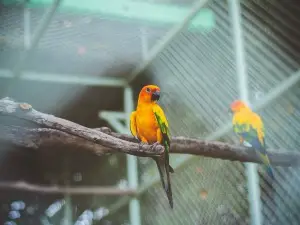
Birds are not like humans, we aren’t the same and we don’t operate the same.
Your bird may do a few things that seem strange, like opening its mouth and stretching its neck.
This article looks into why your bird may be doing this.
Table of Contents
Bird opening mouth and stretching neck:
A bird opening its mouth and stretching its neck may not seem too serious but it may be in some cases.
Here is why your bird may be opening its mouth and stretching its neck:
Clearing its beak or throat:
One of the simplest, and more harmless, reasons why your bird may be opening its mouth and stretching its neck may be because the bird is trying to clear something in its beak or throat.
If your bird isn’t drinking water while it is eating, then one of the seeds from its feed may become stuck in its throat.
If this happens then your bird will open its mouth and stretch its neck to try to get the seed out.
What to do:
This movement will usually get the seed out. You can choose to leave the bird alone or help it.
Helping the bird will look like giving the bird water to drink.
The lodged seed will quickly get down the bird’s throat once the bird has some water.
Gapeworm:
Another reason why your bird may be opening its mouth and stretching its neck may be that the bird has a condition called gapeworm.
Gapeworms are thin red worms that can infect your bird and live in its trachea.
The worms can also live in the bird’s lungs or bronchi.
A variety of birds can become infected with this parasite including chickens, ducks, geese, and pheasants.
In addition to causing your bird to stretch its neck and open its mouth, other signs of this condition include gasping for breath, wheezing or hissing, open-mouth breathing, coughing, and panting.
What to do:
Treatment for this condition is deworming medication.
If you’re raising more than one bird then it is recommended that you treat the whole flock even if only one, or a few birds are showing signs of this condition.
When treating for this condition, you need to treat the flock twice.
The first treatment will treat the worms that are already in the bird’s trachea.
The second course of treatment will treat the worms that hatch from the eggs that the first set of worms produced.
The two sets of treatments will usually be given 7 or 14 days apart depending on the instruction on the dewormer.
Respiratory infection:
The symptoms of respiratory infections in birds are similar to the symptoms of gapeworm infections in birds.
So, if your bird does not have a gapeworm infection then it may have a respiratory infection.
Other signs of a respiratory infection in birds, apart from the bird stretching its neck and opening its mouth, include difficulty breathing, sneezing, coughing, gasping for breath, and nasal discharge.
What to do:
If you think that your bird has a respiratory infection then it is recommended that you take the bird to the vet.
The vet will examine and treat the bird for its condition.
If you enjoyed this article then you may also be interested in other bird related articles. Here are some articles that you may be interested in: Why Does My Bird Open His Mouth When I Pet Him?, Chick Hatched With Open Navel, Why Is My Canary Whimpering?, Pipped Egg Rolled Over, What Do Birds Sharpen Their Beaks With?, Canary Sleeping With Its Head Down, Why Do Birds Adjust Their Crop?, Why Does My Lovebird Rub His Beak On The Cage, Can Baby Birds Drown In The Nest

